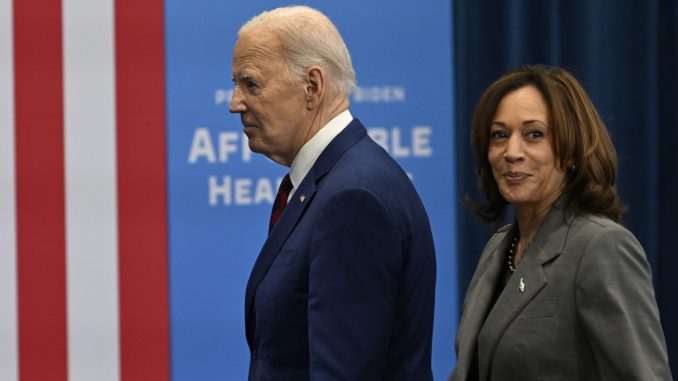
The Biden administration is proposing a new rule that would further entrench unelected federal bureaucrats from accountability to President Joe Biden or his elected successors.
Key to the new rule from the Office of Personnel Management is the effective “grandfathering” of federal employees into their current category of employment, making it harder for a future president to issue an executive order like the one that then-President Donald Trump signed in October 2020 to rein in the bureaucracy.
A rule listed in the Federal Register, like this one was Thursday, could be more difficult to overturn than an executive order because it would have to be reversed under the provisions of the Administrative Procedures Act, one former senior OPM official said.
“If such a rule were allowed to stand, it would tie a future president’s hands—at least temporarily—in carrying out his responsibilities to make and implement his policies,” said Robert Moffit, who was at OPM during the Reagan administration and is now a senior research fellow for health and welfare policy at The Heritage Foundation. (The Daily Signal is Heritage’s news and commentary outlet.)
The president cannot run the huge federal government from his office in the West Wing of the White House, Moffit told The Daily Signal.
Some career federal employees who have civil service protection are neither impartial nor nonpartisan, he added.
“To effect his policy, therefore, the president must not only have the ability to hire political personnel who will carry out his electoral mandate, but also remove career personnel who attempt to obstruct that mandate,” Moffit said. “So, any attack on any president’s capacity to carry out the policies upon which he was elected is fundamentally ant-democratic; it is an attack on the American people who elected him.”
Among other things, the OPM’s proposed rule would clarify that “the status and civil service protections an employee has accrued cannot be taken away by an involuntary move from the competitive service to the excepted service, or from one excepted service schedule to another.”
“Once a career civil servant earns protections, that employee retains them unless waived voluntarily,” the rule says.
In October 2020, just before the election he lost to Biden, Trump signed an executive order to create a new category of federal employee called Schedule F. Personnel in this category are in confidential, policy-determining, policymaking, or policy-advocating positions that remain on the payroll when a presidential transition occurs.
The executive order from Trump, who faced resistance to his policy changes from within the federal bureaucracy, gave agencies more flexibility and oversight for career employees in critical positions that affect policy.
Upon taking office in January 2021, Biden scrapped the Trump order. The final version of the new rule would make it more difficult for a future president to reverse, because it is a regulation published in the Federal Register rather than an executive order. Undoing it would require going through a time-consuming administrative procedure.
Career federal employees enjoy civil service protection, making it nearly impossible to fire them; by contrast, political employees serve at the pleasure of an elected president.
Career federal bureaucrats tend to be overwhelmingly Democrat-leaning based on their campaign donations; federal employee unions donate between 70% and 90% to Democrat candidates. Republicans have accused some career employees of blocking implementation of Republican presidents’ policies.
Project 2025, an initiative led by The Heritage Foundation that establishes a plan for the next conservative presidential administration, calls for restoring Trump’s Schedule F as part of a broader effort to rein in the federal bureaucracy.
This has been a long-standing policy goal for Heritage, Moffit noted.
“Respecting the president’s prerogatives to have the appointees necessary to carry out policies is one of the major reasons why former Heritage President Ed Feulner strongly opposed Republican attempts to hamstring Democratic President Clinton and reduce the number of his political appointees,” Moffit said.
“Political appointees can formulate the details of the president’s policies and see to it that they are implemented all the way down the chain through departments, agencies, subagencies, and bureaus of the federal government.”
Biden’s Office of Personnel Management issued the final rule Thursday, asserting it received 4,000 comments about it, and said the rule would be published Tuesday in the Federal Register.
“This final rule honors our 2.2 million career civil servants, helping ensure that people are hired and fired based on merit and that they can carry out their duties based on their expertise and not political loyalty,” OPM Director Kiran Ahuja said in a public statement. “The Biden-Harris administration is deeply committed to the federal workforce, as these professionals are vital to our national security, our health, our economic prosperity, and much more.”
According to the OPM press release, the new rule also would clarify that the phrase “confidential, policy-determining, policymaking, or policy-advocating” refers to positions that are noncareer, political appointments.
The rule also would establish procedural requirements for moving positions from “career” to “political,” and set up an appeals process for employees.
“Career officials are obviously crucial in the implementation of presidential policy,” Moffit told The Daily Signal. “Those of us who served in presidential administrations all have war stories, however, about how politically hostile civil servants, through various means, including intentional slow-walking or foot-dragging, can delay, thwart, or undermine the president’s policies.”
“A career civil servant who does not or will not carry out the policy of any president, regardless of party affiliation, should have the honor and the decency to resign,” he said. “They should not enjoy regulatory protection.”

